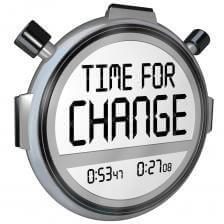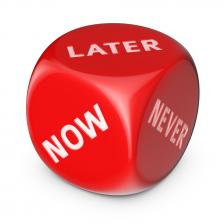How to Be on Time: 10 Tips for Better Punctuality
You may live by the saying, “Better never than late,” or you may follow, “Punctuality is the virtue of the bored.” Any way you slice it, being on time is a struggle for many of us. Here are Savvy Psychologist’s 10 tips to be on time, every time.
Ellen Hendriksen, PhD
Listen
How to Be on Time: 10 Tips for Better Punctuality

Savvy Psychologist listener Joaquin Garzaro of Guatemala City emailed me to ask about my tips for improving his punctuality. I know he’s not alone. So before you’re late for your next very important date, consider these 10 tips for being right on time:.
Tip #1: Re-estimate How Long Things Will Take
Call it sunny optimism or delusional thinking, but many of us under-estimate how long tasks will take. So try taking your original estimate and adding at least 25-50% more time.
The bigger the task or the longer the travel time, the more wiggle room you have to build in. For example, I found out the hard way that writing a grant takes anywhere from 3 to 8 times as long as I originally planned. Estimate your own tasks – small or gargantuan – accordingly.
Tip #2: Account for Transition Activities
Traffic, getting kids out of the house (“You have to poop now?”), and the big one-two punch of parking and walking can derail your schedule and make you late. These are the mundane tasks that stealthily (and consistently) throw off our estimates. Too often we look up the drive time on Google Maps and take the estimate as gold.
Instead, consider bookending that estimate with extra time to find your kid’s other shoe and feed the parking meter. It seems obvious, but it’s not. Try it and watch your life change.
Tip #3: Beware the “One More Thing”

A college friend once said he had to do “just one thing” before a road trip. I envisioned a stop at the ATM or mailbox, but then he proceeded to replace his car’s exhaust system. By himself. With an acetylene torch from the art department.
Even though we know better, we think that last errand will magically take no time at all. So make like Jacques the Shrimp in Finding Nemo and tell yourself “I shall resist.”
Tip #4: Beware the “I’ll Just Do Everything Else Faster”
We might be tempted to press the snooze alarm or squeeze in one last task, rationalizing we’ll just speed up the rest of our morning or our workday.
But it never works; all it does is make us frantic (and, of course, late). So get up on time. This might require a major shift of evening habits to allow you to go to bed earlier, but that’s another podcast in and of itself. Regardless, don’t try to compensate by doing everything else in fast forward.
Tip #5: Rethink Your Semantics
Instead of thinking “We have be at the recital at 5pm,” think “The curtain goes up at 5pm.” There’s a big difference between being in your seat, program in hand, versus having technically arrived, but still cruising around looking for parking at the appointed hour.
So change your wording: “I need to be in the restaurant at 7:30,” “The meeting begins at 2,” or “I have an hour to finish this, and drive there, and park.”
Tip #6: Being Early Is Not a Waste of Time
Most of us hate wasting time. When we’re kept waiting, like in a doctor’s waiting room or a restaurant where we have a reservation, we get annoyed and restless. So we assume that deliberately getting somewhere early will feel the same way. Not necessarily! When you’re deliberately early, you’re in charge, so you get to fill the time however you want.
A tip I often hear is to keep something productive on hand to fill in those empty few minutes: write a thank you note, catch up on work email on your smartphone, read news highlights. If it works for you, great. But also consider using the time for something pleasant, not just productive: look through photos on your phone, read a (heaven forbid) book, or strike up a conversation with other early birds.
(Bonus: at a business event, casual conversation beforehand builds relationships, which qualifies as super productive).
Tip #7: Aim for 10 Minutes Early

The margin of error is too small. Stress is guaranteed. Instead, if your event starts at noon and you aim to get there at 11:50, you have a 10-minute window of arrival. Much more realistic and much less likely to make you swear at red lights.
Tip #8: Transfer Your Biggest Morning Headache to the Night Before
You don’t have to sleep in tomorrow’s clothes, but consider taking the biggest time suck from your morning and doing it the night before. Packing kids’ school lunches, putting your keys, phone, and wallet in one place, even showering, can all be done before you hit the sack.
Tip #9: Think Ahead
Most tips you’ll find here (or elsewhere) are based on the premise that we think ahead about our tasks. For example, do X early, estimate Y more accurately. But most of us are late precisely because we forget to think ahead. We look up the appointment’s address at the last minute and realize it’s farther away than we thought. Or we forget that our reservations are at the height of rush hour.
Thinking ahead gets into more overarching organization and time management skills. But the biggest bang for your buck can come from this: In addition to packing those kid lunches, consider thinking over the next day the night before. (Or for true punctuality ninjas, look at the upcoming week on Sunday night.)
Where do you have to be and when? Are there new addresses to map out online? Are there any really important events, like an interview, a wedding, or a kid performance or game? Anything scheduled back-to-back-to-back? Pinpoint the weak spots and plan (or reschedule) accordingly.
Tip #10: Try it Once and See

Then, observe the process of everyone else’s arrival. Notice how you feel calm instead of frantic, that you don’t have to feel guilty, and most importantly, notice how you feel when others arrive late.
There’s a French saying, which translates loosely as, “While you keep a man waiting, he reflects on your shortcomings” – to which I might add, “…even if you’ve texted that you’re running late.” Putting yourself in the shoes of those you’ve kept waiting is a powerful motivator to change for the better. Shift to being on time and you’ll come off as more professional, more respectful, and more competent. Not to mention more relaxed.
Call it prompt, punctilious, or just plain old on time. There’s no zealot like the newly converted; try it out a few times. You’ll love moving from being put on the spot to getting there on the dot.
There’s time for just one more thing: Check out Never Be Late Again: 7 Cures for the Punctually Challenged by Diana DeLonzor. It’s a well-reviewed book for the punctually challenged.
What are you doing to imrpove your punctuality? Share your thoughts with us on the Savvy Psychologist Facebook page.
And be sure to sign up for the upcoming Savvy Psychologist newsletter. It will arrive in your inbox chock full of great advice to help you meet life’s challenges head on.

